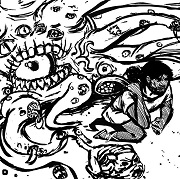|
Raenir Salazar posted:Also if the antagonists don't use PHB spells then thats also potentially unfair to the players who have no idea what to expect and can be totally blind sided and be unable to prepare for an encounter that has special snowflake spells and what have you no? I mean they already come up with custom mechanics for things like monster abilities, so I don't see why having NPC-only spells is particularly unfathomable, especially for spells that are meant to only work as plot devices. If the plot hinges on a cult trying to summon a demon, the mechanics of the summoning ritual aren't really mechanically important beyond how the party can interrupt the ritual and how long the party has before it's completed. The "Summon [x] Demon" spells in 5e are a prime example of the weirdness of this design philosophy since, as written, they're something no PC would bother using at the text specifies the demon you summon is not under your control and is probably just going to murder whoever summoned it and start wrecking up the material plane. It's a spell that clearly exists solely for an NPC to cast to set up the whole "Noooo, you can't kill me, I created yoaaaAAAARGH!!!" cliche and give the party a demon to fight. This could very easily be accomplished by just giving that NPC an ability that says "This guy knows a ritual to summon demon [x]"...Which is what they already do for a bunch of demons who have spell-like abilities that let them summon other demons so I don't know why they need a spell for NPCs to take to replicate that. It reminds me of that godawful LotFP module Carcossa that had pages and pages of mechanics for these super edgy, violent nonsense rituals to summon Elder Gods that do nothing but dick over the person who attempts them (Not to mention this was one of the few mechanics in the book that weren't determined by random dice rolls, which you'd think would be custom suited to making up nonsense evil rituals...).
|
|
|
|

|
| # ? Jun 4, 2024 11:48 |
|
FFT posted:Are you the kind of player that whips open the monster manual in every combat? I don't think its unreasonable for say, the party wizard/sorcerer to be able to know the pertinent details of the spell they're dealing with if its level appropriate or with a passing arcana check; as an example. If homebrew spells or abilities are being used I don't think its unfair automatically but presumably if it affects the plot the players should be able to learn the crunchy details (with the right steps taken) and if its something thats made up on the fly for the "story" that might be hard to properly handle. As an example, if the party confronts the evil wizard but the DM doesn't want the encounter to happen yet, my group would probably call bullshit if the wizard just waved its hand and made the party teleport away without saves for example. Or to put it another way, if you know your about to face a high level wizard, and then gave the wizard entirely homebrew spells you made up; you make it really hard to tactically prepare. Like the steps I took with my wizard to avoid Power Word Kill when Squishy would be entirely for nought if the enemy has Improved Power Word Kill. e: KingKalamari posted:I mean they already come up with custom mechanics for things like monster abilities, so I don't see why having NPC-only spells is particularly unfathomable, especially for spells that are meant to only work as plot devices. If the plot hinges on a cult trying to summon a demon, the mechanics of the summoning ritual aren't really mechanically important beyond how the party can interrupt the ritual and how long the party has before it's completed. IIRC aren't you supposed to summon the demons in the circle (which they can't get out) and then use Planar Binding or similar to bind them to your will? It's a two step process unless you have demons you have a pact with or similar. In combat I think its a risk vs reward situation of sure they might attack you, but if you summon them away from you and in the middle of the enemies (not sure what the casting time is without checking) then it doesn't matter because they don't prioritize you over whats closest. e2: sponszi posted:They wanted the frog to be able to jump 10 ft, they could either give it 10 Str (my verisimilitude?!?) or write that ability, they chose the latter Right, that's the entire extent of my question. That otherwise they would need to give it 10 STR; this way they don't. I am making sure I understand how the ability works and why it exists. Raenir Salazar fucked around with this message at 04:15 on Apr 20, 2021 |
|
|
|

|
|
|
|
Raenir Salazar posted:I don't think its unreasonable for say, the party wizard/sorcerer to be able to know the pertinent details of the spell they're dealing with if its level appropriate or with a passing arcana check; as an example. If homebrew spells or abilities are being used I don't think its unfair automatically but presumably if it affects the plot the players should be able to learn the crunchy details (with the right steps taken) and if its something thats made up on the fly for the "story" that might be hard to properly handle. Sounds a lot like you wanna play a character who both exists in a D&D world and also knows they do, so that they can get mad when they are cosmically cheated. I can dig that. Incidentally what were the steps you took to avoid PWK? Just having 101 hp?
|
|
|
|
Raenir Salazar posted:IIRC aren't you supposed to summon the demons in the circle (which they can't get out) and then use Planar Binding or similar to bind them to your will? It's a two step process unless you have demons you have a pact with or similar. So first of all, Planar Binding is a 5th level spell, while Summon Lesser Demons and Magic Circle are third level, meaning you can summon these demons for four levels without any means to bind them. Second: You''re then using three spell slots for the attempt to get a demon of up to CR5 to serve you for 24 hours (Which is probably not going to happen because the demon has to fail a Charism save and demons tend to be good at those)...Or you could take Polymorph and turn another the party member into a CR 10 creature for an hour by expending a single 4th level spell slot. Are you seeing the cost/utility imbalance here? Raenir Salazar posted:In combat I think its a risk vs reward situation of sure they might attack you, but if you summon them away from you and in the middle of the enemies (not sure what the casting time is without checking) then it doesn't matter because they don't prioritize you over whats closest. Or you could take Fireball (Which is the same level as Summon Lesser Demons) to do the same amount of damage the demons would do and get the same reward without the risk?
|
|
|
|
theironjef posted:Sounds a lot like you wanna play a character who both exists in a D&D world and also knows they do, so that they can get mad when they are cosmically cheated. I can dig that. Incidentally what were the steps you took to avoid PWK? Just having 101 hp? I don't think that's what I said at all? And it was by having a Simulcrum of myself prepared to teleport to my location to revive me. Knowing then what I know now I probably would have used contingency greater invisibility or similar. KingKalamari posted:So first of all, Planar Binding is a 5th level spell, while Summon Lesser Demons and Magic Circle are third level, meaning you can summon these demons for four levels without any means to bind them. Second: You''re then using three spell slots for the attempt to get a demon of up to CR5 to serve you for 24 hours (Which is probably not going to happen because the demon has to fail a Charism save and demons tend to be good at those)...Or you could take Polymorph and turn another the party member into a CR 10 creature for an hour by expending a single 4th level spell slot. Are you seeing the cost/utility imbalance here? I think there are some different assumptions happening here. I am assuming you're talking about an NPC, in which case an evil NPC antagonist could if the narrative calls for it, presumably access the most expedient means of binding demons to its service; whether its from an ancient magic item they stole that gives them that ability, making a pact, or whatever else. All of these things exist in the game. For players it depends, there were circumstances in my last campaign where summoning two imps literally saved our bacon by being a goddamned nuisance to the enemy in ways a fireball wouldn't have. Due to the action economy depending on the difficulty of the encounter, a fireball is less utility than having multiple additional pieces on the board to take turns and distract the enemy. Also nothing stops you from actually just talking to the demons and persuading them to help you. Just win a persuasion check, very easy if you're a charisma caster; or if you aren't the Party Face then someone else presumably is and they can do the talking to sweet talk them; there's no rule against this. Starting hostile doesn't preclude talking, since its a free action. Also why take fireball when you want to summon demons instead? Cue "why cure cancer when I can turn people into dinosaurs".jpg.
|
|
|
neonchameleon posted:As for the non-combat effectiveness of the 4e fighter, remember that it was following the 3.5 one that got 2+Int skill points per level and for whom climb, jump, and swim were all separate skills - and if the fighter wanted to wear plate armour they took a truly ridiculous penalty to a range of skills including stealth. 4e fighters I find slightly more versatile out of combat than 5e fighters, but that's because I always take at least one multiclass feat early and often use utility skill powers (and in terms of skills I've created 4e fighters that could challenge 3.5 rogues thanks to two multiclass feats. The default difference between 4e and 5e fighters isn't huge however (3 skill proficiencies out of 17 vs 4 required to cover 17 skills, languages, and tools with the 4e proficiency bonus being bigger). The 3.X fighter however had a pathetic skill list, a terrible number of skills, and then took savage penalties on a wide range of skills including almost half their class skills from armour. When what you are used to is the 3.X fighter both the 4e one and the 5e one who both reach the bar for basic competence feel like bliss. The 3.5 fighter had been dissected to death long before 4e came out. It was not a good class, it did not work on a good paradigm, the 3.5 feat system was an abomination that deserved to be smothered by a pillow, yadda yadda. Even your example above requires multiclassing the fighter and tacking on the skill power system, and I'm not going to lie, caring about skills in 5e is a really weird path to take because the entire 5e skill system relies on whipping out your Old Man Henderson backstory and arguing with the DM whether climbing a tree is a "hard" or "very hard" athletics check and whether you can use acrobatics instead, or maybe religion because it's a "sacred tree". Like, yes, if you go out of your way like you did, the fighter can pick up a bunch of nonfighter powers and be tolerable, but I can also dump a bunch of resources into a 3.5 fighter taking use magic device. I'm just not impressed with 4e's half-assed execution and slow realization of things the community figured out years before, and we knew this going in when the designers started talking about how fireball was a battlefield control spell or that actually there'd be a smaller christmas tree. The point I'm making is that the 3.5 fighter being a horse is not an excuse for designing a bad car. Now, I will concede that the D&D team has the problem of making the fighter "feel like D&D" at high levels when E. Gary Gygax personally told me that they never played or tested high level fighters and thus everyone has their own weird vision ranging from a feudal lord to an anime superhero to Beowulf to a totally mundane guy somehow going toe to toe with dragons in a way that's totally nonmagical, but you can really do better than "man who swords" for an entire schtick. (I may also be mad that the 5e fighter gets 4 superiority dice and goes right back to autoattacking, but that's another issue for another day.)
|
|
|
|
|
Raenir Salazar posted:I think there are some different assumptions happening here. I am assuming you're talking about an NPC, in which case an evil NPC antagonist could if the narrative calls for it, presumably access the most expedient means of binding demons to its service; whether its from an ancient magic item they stole that gives them that ability, making a pact, or whatever else. All of these things exist in the game. The point I'm gettin at is that these spells are presented as options the PCs can take, but are only of reasonable use to NPCs as a plot device. And if they're a plot device they don't need the majority of the mechanics the book presents for the spell. Raenir Salazar posted:For players it depends, there were circumstances in my last campaign where summoning two imps literally saved our bacon by being a goddamned nuisance to the enemy in ways a fireball wouldn't have. Due to the action economy depending on the difficulty of the encounter, a fireball is less utility than having multiple additional pieces on the board to take turns and distract the enemy. Well, for one thing Persuasion checks aren't just a "make an NPC do whatever I want" roll and are dependent on the DM thinking the request you're making is reasonable, which is kind of indicative of the reason the Summon [x] Demon spells aren't good player options. Both of those spells have a number of riders that give the DM carte blanche to nullify what the caster is trying to accomplish with the spell - The DM chooses what type of demon is summoned, the DM controls the demon's actions, etc. Any one of these could be used by the DM to foil the caster's plans, which wouldn't be noteworthy if the majority of other spell options available at the same level didn't allow the caster to just achieve things without going through the lengthy process of "DM may I?". Raenir Salazar posted:Also why take fireball when you want to summon demons instead? Cue "why cure cancer when I can turn people into dinosaurs".jpg. Why should a character based on summoning demons be mechanically disadvantaged compared to a character who throws fireballs?
|
|
|
|
KingKalamari posted:Why should a character based on summoning demons be mechanically disadvantaged compared to a character who throws fireballs? I don't understand the question. I am just pointing out that I have literally seen a situation where summoning imps was better than fireball; and also that I don't think it makes sense to only consider the most optimal build or play style. KingKalamari posted:The point I'm gettin at is that these spells are presented as options the PCs can take, but are only of reasonable use to NPCs as a plot device. And if they're a plot device they don't need the majority of the mechanics the book presents for the spell. I mean, doesn't this imply that it's a situational use spell then? In the hands of a creative group of players the sky is the limit; even if it requires the DM to allow it, why wouldn't the DM allow it? It'd be funny, cool, or provide content for the game and interesting and memorable moments to have the player have to argue with an irate Imp or whatever. Isn't it the entire point of playing D&D is that it is a collaborative process? Yes you probably won't take this spell if you're limited to exactly what it says and the DM is a beep boop rules robot; but I don't think that describes very many games. Especially not for example my game where my DM lets me yeet swords for extra damage based on the damage dice of the thing being yeeted with catapult. I feel like there's a lot of spells whose usefulness comes down to how cooperative the DM is and I don't see any reason why we must for our discussion assuming only the most Lawful Neutral approach as the default.
|
|
|
|
Raenir Salazar posted:I don't understand the question. I am just pointing out that I have literally seen a situation where summoning imps was better than fireball; and also that I don't think it makes sense to only consider the most optimal build or play style. I'm saying if a player wants to play a character whose whole thing is summoning demons, why should the mechanics of the game punish them by making them less viable than a character who just hucks fireballs around? Why is the spell to summon demons arbitrarily worse than other spells of that level? The Summon Demon spells are also more restrictive than those to summon other types of entities (Conjure Elemental, Conjure Celestial, Conjure Fey, etc.) because all of those spells specifically mention that the summoned creatures are friendly to you and your allies. The mechanical capabilities of the creatures summoned are pretty much identical to the demons you can summon, but they also won't attack you and your party unless you lose concentration on the summoning spell. Why are the mechanics arbitrarily more punishing for the player who wants to summon a demon?
|
|
|
|
KingKalamari posted:I'm saying if a player wants to play a character whose whole thing is summoning demons, why should the mechanics of the game punish them by making them less viable than a character who just hucks fireballs around? Why is the spell to summon demons arbitrarily worse than other spells of that level? I'm not sure I agree though, because in a "real" campaign a player that is summoning demons probably has a bunch of magic items or support in their party to make it as viable, and probably better than Fireball, because the action economy of having multiple demons at your beck and call might easily outpace fireball; you just have to build around it (like I do with Catapult) with some work with your DM, and for the most part this doesn't need any homebrew; although homebrew would make it easier; but I could easily see such homebrew simply taking existing spells and making a good magic item out of it or a feat/ability that combines different things together. And not something that is just completely out of context with what exists in the PHB/DMG/Or some Splatbook/UA. As an example, "Staff of Binding" that's basically Staff of the Magi but just for Summoning and Binding demons. Maybe an NPC has it, but the PCs can easily take it from their corpse and use it to make their demon summoning build way better. Slowly build up an army of demons, etc. An evil aligned party probably has less scruples about pacts as well, I can easily imagine a PC pulling a whathisface from Neverwinter Nights 2. I think what I'm essentially saying is, the more out of step something else from what's written down, the more I think it needs to give the players a chance to experience it in a somewhat safe environment with some varied number of degree of separation so they can be able to anticipate it. For example, the staff I suggested above, suppose it waives the concentration requirement (if any) still presumably takes time to build up an army of demons; and doesn't just instantly summon them, the party presumably over the course of the adventure encounters the fiendish servants of their antagonist well in advance of eventually meeting them, and have oppurtunities to research rumours of the great power this dark summoner wields; and their actions could/should have ramifications on how easy/challenging their final confrontation is; i.e if they discover the village thats being constantly raided for slaves, and they defend it, they manage to defeat in piece meal a large chunk of the summoners demon army, leaving far fewer demons to defend him at the end (at the cost of making them more aware of the heroes earlier to take more proactive measures, i.e harder lead up to the final but easier fight vs an easier lead up but harder final fight).
|
|
|
|
Summon lesser demons creates a 5 foot circle the demons have to stay out of, so it's not completely unusable.
|
|
|
|
|
KingKalamari posted:The Summon Demon spells are also more restrictive than those to summon other types of entities (Conjure Elemental, Conjure Celestial, Conjure Fey, etc.) because all of those spells specifically mention that the summoned creatures are friendly to you and your allies. The mechanical capabilities of the creatures summoned are pretty much identical to the demons you can summon, but they also won't attack you and your party unless you lose concentration on the summoning spell. Why are the mechanics arbitrarily more punishing for the player who wants to summon a demon? Summon Greater Demon is 4th level, Conjure elemental is 5th level, Conjure Fey is 6th level, and Conjure Celestial is 7th level. Summoning demons is easiest because they want to leave the abyss and do havoc on the material plane, its also the most dangerous.
|
|
|
KingKalamari posted:The Summon Demon spells are also more restrictive than those to summon other types of entities (Conjure Elemental, Conjure Celestial, Conjure Fey, etc.) because all of those spells specifically mention that the summoned creatures are friendly to you and your allies. The mechanical capabilities of the creatures summoned are pretty much identical to the demons you can summon, but they also won't attack you and your party unless you lose concentration on the summoning spell. Why are the mechanics arbitrarily more punishing for the player who wants to summon a demon? Conjure Elemental also says that they become hostile to you if you lose concentration, and unlike Summon Greater Demon will stay for the full hour instead of disappearing in 1d6 rounds. Conjure Celestial is a 7th level spell, Summon Greater Demon 4th, and both give you a CR 4 creature. Conjure Fey has the same downsides as Conjure Elemental. Plus you can do something like summon a demon on enemy archers, and drop concentration on your next turn on something else while the demon continues attacking the nearest non-demons (likely still your enemies) for 1d6 rounds. It's not as good as the TCOE summon spells, but it's fine compared to other PHB single creature summons. Staltran fucked around with this message at 08:08 on Apr 20, 2021 |
|
|
|
|
A quatl, which is cr 4, punches far above its weight though. Greater restoration, 3x cure wounds and bless, shape changing, detrct magic at will. Knock-out poison bite. Also it's nice.
|
|
|
|
Oh, and immunity to non magic melee attacks.
|
|
|
|
Don't forget being able to cast Shield the first three rounds of a fight and an attack that applies restrained on a hit. Although, to be fair, my experience is that it's pretty par for a cr5 monster
|
|
|
|
It's really funny how the couatl was literally the only target for Conjure Celestial for a long time, unless your DM decided to dick you over and give you a Pegasus since Conjure Celestial is a creature UP TO CR4. Even nowadays the grand total of targets if you include every book is like... Three. It's even funnier how the upcast could only possibly get you a Unicorn, who is arguably WORSE than a Couatl.
|
|
|
|
What sourcebook is this from? I like it.
|
|
|
|
Libertad! posted:What sourcebook is this from? I like it. Thanks, it's something I'm working on 
|
|
|
|
TheGreatEvilKing posted:This was kind of a problem with 4e in general, honestly. People like to talk up how the 4e fighter was like, super hard core and badass, but said fighter was still usually incapable of contributing anything outside combat (the only social skill he gets is Intimidate, which auto-fails skill checks but forces combat surrenders) and the PHB fighter has a much smaller selection of actual powers to choose from because they all have weapon riders. (I only own PHB, Martial Power 1, and one of the Essentials books, so bear with me). The devs sold high level fighters as being able to knock down buildings, but your 1st level fighter gets a 3W damage daily and your 29th a 9W damage daily in a system where the 4e thread OP on this site tells you you need to rewrite the OG monster manual with the MM3 errata that reduces monster HP. I think my favorite example of this is the demigod class, where the fluff is that you eventually split the sky as a new god arises, and the only things you get out of it are a passive stat boost and meh regeneration, and finally a reprieve from spamming at-wills at the very end of the game. You can't found a church or perform miracles or anything. People will cherry pick stuff like Dark Wanderer or Legendary Sovereign or that class that can plane shift in Manual of the Planes, but you have to contrast it with stupid crap like the paragon path in Arcane Power that gives you the ability to teleport slower than you walk. I have that exact same complaint about 4e. Literally the exact same complaint. If you're fighting like a solo tough boss, once you burn your encounters / dailies (if you still had them up by that point) the at-will powers you have are all but functionally identical to the autoattacks just with flavor. 4e by far was way, way worse about stat and HP bloat on mobs than 5e or even 3.5 and the way the encounters scaled absurdly into the higher levels meant that players had to aggressively charop and gear treadmill to keep up with the Joneses (even with characters that could "break the HP slog zones" like ranger) in generally uninteresting ways. Feat bloat / tax was real and intense and you could very easily make a character build that is functionally useless by even midgame. You pretty much hard set your gear when you first get magic items at level 1 and most of your progression consists of "The same item, but ++1" all the way into endgame, which isn't terribly interesting. That and I really have a significant disdain for how rigid the role system was in 4e. Are you a hard controller class fighting a solo tough? Eat poo poo and die peasant because you're going to be completely ineffective. It's not to say I didn't have fun with 4e (and I did have some good fun with it at points) but it didn't really solve a lot of the fundamental problems with 3.5. Neither did 5th, for that matter, but I still find 5 way easier to play both as a player and as a DM.
|
|
|
|
Ultimately the big difference is that during its lifespan 4e acknowledged and fixed that problem. Believe me, even those of us that love 4e know the MM1 and 2 are hit point garbage pinatas. The worst is when some bloated monster has a Bloodied Reaction of like "Gain 250 HP" or some nonsense. That they actually did address it during the lifetime of the product instead of rephrasing "ask your DM" again is at least a point in 4e's favor. MM3, Monster Vault, and the Dark Sun Creature Companion are full of monsters that hit harder and die faster.
|
|
|
|
TheGreatEvilKing posted:This was kind of a problem with 4e in general, honestly. People like to talk up how the 4e fighter was like, super hard core and badass, but said fighter was still usually incapable of contributing anything outside combat (the only social skill he gets is Intimidate, which auto-fails skill checks but forces combat surrenders) and the PHB fighter has a much smaller selection of actual powers to choose from because they all have weapon riders. (I only own PHB, Martial Power 1, and one of the Essentials books, so bear with me). The devs sold high level fighters as being able to knock down buildings, but your 1st level fighter gets a 3W damage daily and your 29th a 9W damage daily in a system where the 4e thread OP on this site tells you you need to rewrite the OG monster manual with the MM3 errata that reduces monster HP. I think my favorite example of this is the demigod class, where the fluff is that you eventually split the sky as a new god arises, and the only things you get out of it are a passive stat boost and meh regeneration, and finally a reprieve from spamming at-wills at the very end of the game. You can't found a church or perform miracles or anything. People will cherry pick stuff like Dark Wanderer or Legendary Sovereign or that class that can plane shift in Manual of the Planes, but you have to contrast it with stupid crap like the paragon path in Arcane Power that gives you the ability to teleport slower than you walk. Wow, what a coincidence! I actually had to look that one up recently and it's a lot better than you think. That's another thing with 4E, some of the designers just thought their keyword-based rules system was the cat's pajamas and left implicit rules just hanging loose. When a regular ol' Speed 6 player character gets teleport 2 as an alternate mode of movement, that doesn't mean on their turn they can either walk 6 squares or teleport 2. It means they can move 6 squares and up to 2 of them can be a teleport, because that's how the rules for combining alternate modes of movement work. Except players are mostly going to ignore those rules because players getting alternate modes of movement is about as rare as hens' teeth, and a DM running a monster where the alternate mode of movement rules might apply is probably not even going to suspect there are special rules, just go with their first instinct and run them wrong, putting the monster at a slight disadvantage but who cares because the monster's just there to die.
|
|
|
|
I think we can all agree 4E was a success because it gave us yet another planet-sized enemy to fight Hello beautiful DourCricket fucked around with this message at 17:35 on Apr 20, 2021 |
|
|
|
I think it's probably best to move any more detailed discussion of 4E to the 4E thread.
|
|
|
|
Can someone please explain how jumping works, the PHB is super unintuitive and I've never figured it out. Does jumping past an enemy trigger an attack of opportunity? If you can't jump further than your speed, are high strength characters unable to run and then do a long jump since that would push them past the limit? ARGH
|
|
|
|
change my name posted:Can someone please explain how jumping works, the PHB is super unintuitive and I've never figured it out. Does jumping past an enemy trigger an attack of opportunity? If you can't jump further than your speed, are high strength characters unable to run and then do a long jump since that would push them past the limit? Yes to all of that, it seems like you have a good understanding of it. Jumping is a special movement, but every foot cleared costs a foot of movement. If you are having issues with a jump bumping up against your movement limit, then take the Dash action to double it. Kaal fucked around with this message at 17:44 on Apr 20, 2021 |
|
|
|
You only provoke an OA if you leave an opponentís reach. Unless you leap high enough that your DM rules the enemy canít reach you, you should be safe because youíre moving within their reach. Edit: For some reason Iím assuming you meant to begin and end your jump next to the opponent.
|
|
|
|
https://www.sageadvice.eu/2014/09/18/super-jump/ Sage advice, if you or your DM cares at all. There's no errata that I can tell. For AoO, definitely if the jump makes you leave the enemies threatened square. For a long jump its equal to your strength score, so with a 20 str you could jump 20 feet after moving 10 for the runup, then stop at 30. If you take the dash action you could jump further, with say, the jump spell.
|
|
|
|
DourCricket posted:https://www.sageadvice.eu/2014/09/18/super-jump/ Yeah Boots of Striding and Springing were what I needed help with specifically as a boss tonight will have a pair, but also... the item description literally says you can't jump past your movement speed so I don't know why that was a question they had to rule on
|
|
|
|
change my name posted:Yeah Boots of Striding and Springing were what I needed help with specifically as a boss tonight will have a pair, but also... the item description literally says you can't jump past your movement speed so I don't know why that was a question they had to rule on Boots of Striding and Springing seems to basically be "Dwarf Shoes", if that helps you parse it.
|
|
|
|
Metzen's Auroboros campaign launched its Kickstarter today and already hit ~300k. https://www.kickstarter.com/projects/warchief/auroboros/rewards
|
|
|
|
Jumping rules in 5e leads to one of my favourite "natural language" clusterfucks: if you can jump more than 10 feet in the air, how does jumping interact with fall damage? Sage advice has previously given three answers on it: Option 1, you take fall damage as normal: https://twitter.com/JeremyECrawford/status/657843359705337856?s=20 Option 2, you take fall damage only if you fall further than your jump distance: https://twitter.com/JeremyECrawford/status/636288928757104640?s=20 Option 3, you only start falling when you run out of movement: https://twitter.com/mikemearls/status/758561843891752964?s=20 Of course all of these are just some bullshit without reason, because there's no actual explanation in the rules, so do what you want, but I'm rather partial to option 3 where you can take the dash action and jump out of a 60ft high window and take no damage, cause that's pretty loving cool.
|
|
|
|
Personally I don't see why it wouldn't be Option 1: Falling isn't even mentioned in the movement section and you don't take fall damage until you've fallen 10 ft - which is higher than a character can typically jump (3 + STR Mod ft). If you're jumping off a 30 ft wall, you take fall damage. If you're using rocket boots and they short out 50 ft in the air, you take fall damage. Given how many ways there are to avoid fall damage already, I can't really see what the point of the falling rules would be if they don't matter until after 60+ ft.
|
|
|
|
I'd go with the first ruling if it wasn't due to a spell or magic item, but personally I'd side with ruling 3 if they used boots or a jump spell, coming back down from the jump seems like an intrinsic part of the magic. No one would use a spell that just murdered you when you landed like that one Morrowind NPC
change my name fucked around with this message at 20:11 on Apr 20, 2021 |
|
|
|
change my name posted:I'd go with rule 1 if it wasn't due to a spell or magic item, but personally I'd side with ruling 3 if they used boots or a jump spell, coming back down from the jump seems like an intrinsic part of the magic. No one would use a spell that just murdered you when you landed like that one Morrowind NPC You could just use it to jump to higher vantages, but yes I agree
|
|
|
|
change my name posted:I'd go with rule 1 if it wasn't due to a spell or magic item, but personally I'd side with ruling 3 if they used boots or a jump spell, coming back down from the jump seems like an intrinsic part of the magic. No one would use a spell that just murdered you when you landed like that one Morrowind NPC This is how I'd see it.
|
|
|
|
This video is cool https://www.youtube.com/watch?v=Eb5mYqnKFlI 
|
|
|
|
Kaal posted:Personally I don't see why it wouldn't be Option 1: Falling isn't even mentioned in the movement section and you don't take fall damage until you've fallen 10 ft - which is higher than a character can typically jump (3 + STR Mod ft). If you're jumping off a 30 ft wall, you take fall damage. If you're using rocket boots and they short out 50 ft in the air, you take fall damage. Given how many ways there are to avoid fall damage already, I can't really see what the point of the falling rules would be if they don't matter until after 60+ ft. Option 3 is definitely ridiculous in its implications, but playing devil's advocate, it does have one virtue in that it draws a distinction between voluntary and involuntary downward movement. As in, it means there's a difference between falling from height and jumping from height. Someone pushes you off a ledge, you fall; if you jump of the ledge, you didn't fall, you jumped.
|
|
|
|

|
| # ? Jun 4, 2024 11:48 |
|
Reveilled posted:Option 3 is definitely ridiculous in its implications, but playing devil's advocate, it does have one virtue in that it draws a distinction between voluntary and involuntary downward movement. As in, it means there's a difference between falling from height and jumping from height. Someone pushes you off a ledge, you fall; if you jump of the ledge, you didn't fall, you jumped. I get that distinction, I just don't really see a reason to model it in the rules. How many times is falling damage really going to come into play in a campaign? I don't see much reason to further reduce that paltry number, particularly based on a natural language argument.
|
|
|































